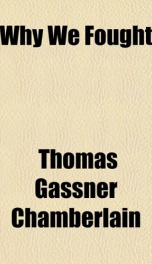why we fought

Purchase of this book includes free trial access to www.million-books.com where you can read more than a million books for free. This is an OCR edition with typos. Excerpt from book: ENFORCEMENT OF COVENANTS The members of the League are nations that regard treaties of peace not as scraps of paper but as solemn obligations. If, however, any nation should undertake hostility in violation of the Covenant to allow arbitration or inquiry first, then such nation is to be immedi- diately boycotted by all the others. This means that all relations financial, commercial, personal are to be severed with the offending nation. This represents a very grave penalty indeed. There was a time when nations could stand alone and by themselves, but today, with the progress of civilization, the development of mechanical methods, and especially the improvement in means of transportation, no nation can provide for its citizens a satisfactory state of welfare without the most extensive international relations. These international relauons are not theories, they are facts. The disputes arising out of them are not theories, they are facts. The machinery for dealing with these disputes when they arise, and for settling them more economically and more justly than they could be settled through war, is to-day a theory, and it remains for enlightened American opinion to translate this theory into a fact. Through the arteries of trade the life of nations is linked up. The vitality of nations is such a common thing that no nation can enjoy a state of peace while other great nations are at war. How well do we know this from our experience prior to our entry into the Great War. To-day no nation can claim neutrality as a right any more than the citizen at common law could claim to stand aside as a right while the criminal was t :ing pursued. The peace of the world is the business of the world, and in that business the United States must share her part of the responsibility. It is...
Info about the book
Author:
Series:
Unknown
ASIN:
014303765X
Rating:
3/5 (4)Your rating:
0/5
Languge:
English
Users who have this book
Users who want this book
What readers are saying
What do you think? Write your own comment on this book!
write a commentif you like why we fought try:
Other books by this author
Do you want to read a book that interests you? It’s EASY!
Create an account and send a request for reading to other users on the Webpage of the book!

